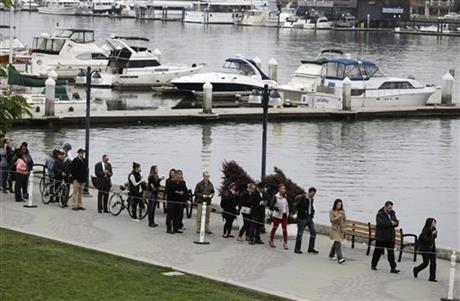
By LISA LEFF and TRACIE CONE
With the BART transit system on strike, people wait in line to catch a ferry to San Francisco Monday, Oct. 21, 2013, from Jack London Square in Oakland, Calif. San Francisco Bay Area commuters started the new work week on Monday with gridlocked roadways and long lines for buses and ferries as a major transit strike entered its fourth day. At the same time, federal investigators were searching for clues to a weekend train crash that killed two workers.(AP Photo/Eric Risberg)
OAKLAND, Calif. (AP) — Frustrated San Francisco Bay Area commuters started the work week Monday facing gridlocked roadways and long lines for buses and ferries as a major transit strike entered its fourth day, increasing pressure on negotiators to reach a deal that resumes train service.
But there were signs of movement from the Bay Area Rapid Transit agency and its unions. BART spokesman Rick Rice said both sides would return to the bargaining table Monday afternoon and BART hopes to reach an agreement by 6 p.m. so trains can begin running Tuesday.
Amalgamated Transit Union local President Antonette Bryant confirmed the talks and said both sides were already back at the bargaining table around 2:30 p.m. She declined to comment further.
Federal investigators, meanwhile, were searching for clues to a weekend train mishap that killed two workers.
Many commuters left for work before dawn Monday only to wait for buses and ferries and sit in traffic. Some said the accident, while tragic, didn’t affect their feelings about the strike.
BART has said a four-car train carrying several employees was returning Saturday from a routine maintenance trip and being run under computer control when it struck workers inspecting a section of track in Walnut Creek.
The Contra Costa County Coroner’s Office identified the victims as Laurence Daniels, 66, of Fair Oaks and Christopher Sheppard, 58, of Hayward. BART has said one was an employee and the other a contractor, but further details weren’t immediately available.
The train was not carrying any passengers due to the strike.
“I think the issues that led to the strike are still there,” said Peter Goodman, an attorney who was waiting to pick up additional riders at a carpooling stop. “It may create some additional sympathy for the BART workers, but I think overall it’s going to be determined by the economic issues.”
Traffic leading to the San Francisco-Oakland Bay Bridge was already snarled for miles by 6 a.m. At BART’s station in Walnut Creek, the line for charter buses was at least a hundred-people deep before dawn.
By 7:35 a.m., BART reported that only two of the nine stations offering charter buses had available seats.
“We need BART to be running right now,” Karen Wormley said as she waited for a bus in Walnut Creek. “I need to get to work.”
BART, the nation’s fifth-largest commuter rail system, has an average weekday ridership of 400,000.
BART presented what it called its last and final offer a week ago but was open to restarting the negotiations if that is what a federal mediator overseeing the process wants, BART spokeswoman Alicia Trost said.
Bryant said before Monday’s talks were announced that she would put BART’s final contract offer before members for a vote this week, however, she expected it to be rejected.
Officials have said the two sides generally agree on economic issues but came to an impasse over work rules, including the length of work days and when overtime pay kicks in, the union said.
The ATU and Service Employees International Union said a proposal submitted to BART on Sunday would allow for changes in work rules related to implementing new technology and retain rules related to safety, the San Francisco Chronicle reported.
Meanwhile, a federal investigator said the train that killed the two workers didn’t have a front-facing video recorder. Interviews, inspections, audio recordings and camera footage from the train’s cab should provide enough evidence to determine a cause, they said.
It could take several weeks to determine if the work stoppage or the way BART management deployed non-striking workers played a role in the fatalities, said Jim Southworth, the National Transportation Safety Board’s railroad accident investigator-in-charge.
BART officials said Sunday that they could no longer discuss the accident because of the ongoing NTSB investigation.
The workers were the sixth and seventh to die on the job in the 41-year history of the system.
The ongoing investigation at the collision site could delay the resumption of service if the strike ended immediately, Southworth said.
On Sunday evening, transit workers held a candlelight vigil for their colleagues.
___
Cone reported from Fresno. Associated Press writer Haven Daley contributed to this report.


